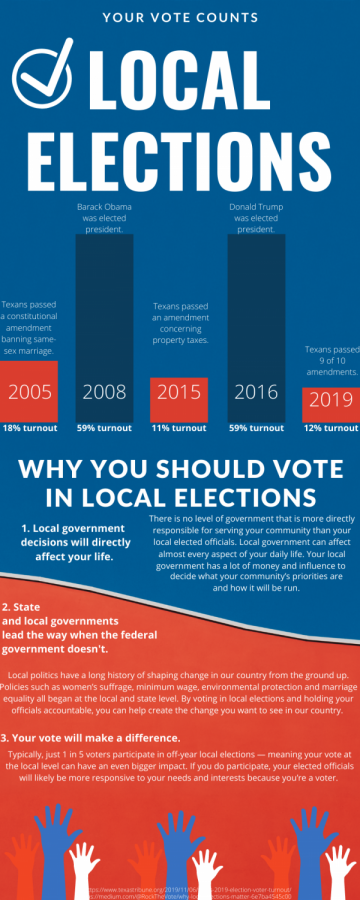Students, staff reflect on the importance of local elections
Video produced by Haley Pacheco
Political signs placed on the intersection of Josey Lane and Hebron Parkway in Carrollton, Texas. Many candidates have signs in front of the city library because it is a popular polling station amongst residents.
As the Nov. 3 elections are just weeks away, teachers reflect on the importance of student voices in their community, as well as the impact of youth activism.
On an average election year, the administration organizes a voter registration drive to register of-age seniors. Due to extenuating circumstances caused by COVID-19, the voter registration drive was reduced to handing out registration cards to students who were already 18, or would be by the Oct. 5 registration deadline.
“We did a voter registration drive, but we couldn’t have the table and [speakers] come out and talk to us about why voting is important,” art teacher Jennifer Russell. “But, we delivered the voter registration cards to the students who were eligible; it was kind of under the radar, but it happened.”
Lewisville Independent school board Places 6 and 7 incumbent members and the Texas Board of Education District 14 candidates will be present on the upcoming ballot. These locally elected officials influence the education system as they work together to create guidelines for Texas school districts’ curriculum.
“I feel like our local elected representatives and congresspeople have more power over us directly, than our president at this point,” Russell said. “I think our local elections are so much more important, as a teacher and an educator voting for elected representatives and your school board members are the people who are going to directly impact me, and by default [students].”

Two hundred fifty seniors are eligible to vote this coming election. As first-time voters, AP English III teacher and Junior Statesmen of America sponsor Jeanette Rooks said people often overlook the significance of local elections, and their power in the community.
“All of us should care more about who the people are right here and what kind of decisions they are making,” Rooks said. “That’s the starting place for people who do move up and move into those positions that we do care more about. I know a lot of young people want to see major change on certain things, but the people who might make those changes are in those really small roles right now, they are not necessarily people whose names you know yet.”
Students who are unable to vote can still be active in the local political climate by staying informed, signing petitions and attending protests.
“You can’t really change anything unless you’re actively involved,” AP United States History teacher Travis Zuber said. “So I try to point out instances where people who did not have voting rights were able to make changes and were able to get involved. In history, we talk about women or African Americans before voting capabilities were extended, and how they used petitions and protests and other things to get involved.”
Students can stay responsibly informed by getting news from multiple sources. Publications such as Dallas Morning News, The Texas Tribune and CBS Dallas cover local and state-wide campaigns.
“Local elections are really important,” AP Government teacher Travis Fitzgerald. “It’s easy to get caught up in the media horse race of the presidential election, but it’s important to keep in mind that your local elections matter a whole lot too. A vote for the presidency is kind of a little pinprick because you’re one of millions, but on the local level it’s more like a sledgehammer.”
According to The Conversation, The United States has one of the lowest youth voter turnout rates in the world. The gap between 18 to 29-year-olds and those over 60 is more than twice as large here than in comparable democracies, like Canada and Germany.
“Elected officials are not really leaders, they’re followers, and they’re going to follow where the votes are,” Fitzgerald said. “If 18-29-year-olds voted even just 5-10% more, you would start to see [elected officials] begin to pay more attention. If young people don’t vote in 2020, then there’s no hope for the youth.”



